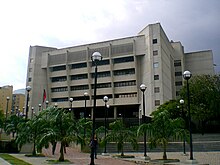This is an old revision of this page, as edited by Coyets (talk | contribs) at 09:00, 2 December 2012 (added Category:1999 establishments in Venezuela using HotCat). The present address (URL) is a permanent link to this revision, which may differ significantly from the current revision.
Revision as of 09:00, 2 December 2012 by Coyets (talk | contribs) (added Category:1999 establishments in Venezuela using HotCat)(diff) ← Previous revision | Latest revision (diff) | Newer revision → (diff)| Supreme Tribunal of Justice Tribunal Supremo de Justicia | |
|---|---|
 TSJ building in Caracas TSJ building in Caracas | |
| Location | Caracas |
| Authorised by | Constitution of Venezuela |
| Website | Official website |
| President | |
| Currently | Luisa Estella Morales |
The Supreme Tribunal of Justice (Template:Lang-es or TSJ) is the highest court of law in the Bolivarian Republic of Venezuela and is the head of the judicial branch.
The Supreme Tribunal may meet either in specialized chambers (of which there are six: constitutional, political/administrative, electoral, civil, criminal, and social) or in plenary session. Each chamber has five judges, except the constitutional, which has seven. Its main function is to control, according to the constitution and related laws, the constitutionality and legality of public acts.
The Supreme Tribunal's 32 justices (magistrados) are appointed by the National Assembly and serve non-renewable 12-year terms. Appointments are made by a two-thirds majority, or a simple majority if efforts to appoint a judge fail three times in a row. Under article 265 of the 1999 Constitution, judges may be removed by a two-thirds majority of the National Assembly, if the Attorney General, Comptroller General, and Human Rights Ombudsperson have previously agreed a "serious failure" and suspended the judge accordingly.
History
The Tribunal was created under the 1999 Constitution of Venezuela, replacing the Supreme Court of Venezuela. For some years provisional statutes regulated the number of judges - initially 20, with three in each chamber except the constitutional, which had seven - and their selection. The statutes were replaced in 2004 by an "organic law" (a law required to clarify constitutional provisions). The law also permitted the National Assembly to revoke the appointment of a judge, by a simple majority, where a judge had provided false information as to his/her credentials.
References
- ^ Venezuelanalysis, 17 May 2004, “The Venezuelan Judicial System always was the Cinderella of the State Powers”
External links
| Supreme Courts of South America | |
|---|---|
| Sovereign states | |
| Landmarks of Caracas | ||
|---|---|---|
| Museums |
|  |
| Religion | ||
| Culture and sport | ||
| Government | ||
| Public art |
| |
| Other |
| |
This government-related article is a stub. You can help Misplaced Pages by expanding it. |